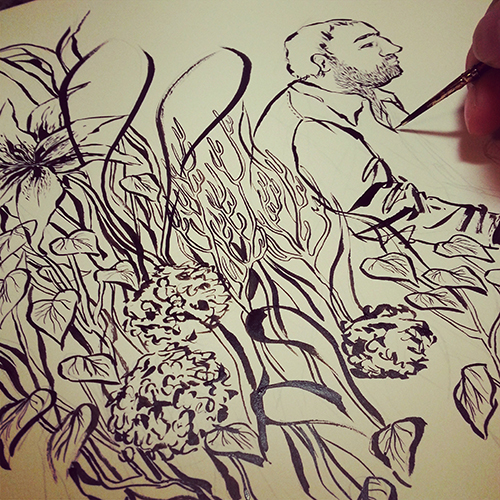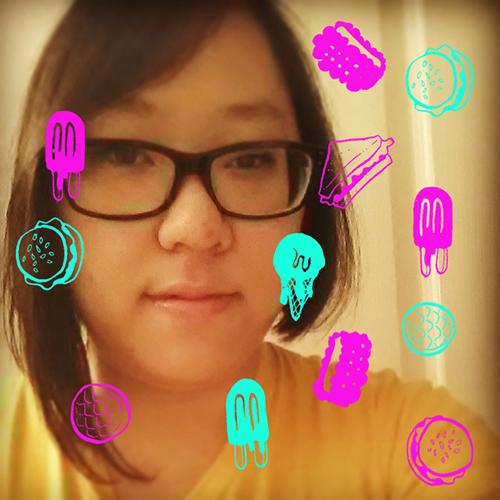
Rosena Fung is an illustrator and comic artist hailing out of Toronto. She began her path to visual narrative a little differently–she attended the University of Toronto and received her Masters in Anthropology, intending on becoming a research professor. She spent so much time drawing while attending UToronto that after finishing school there, she went to OCAD University to study Illustration. She finds it is one of the best things she has ever done.
Could you tell us about your current studio practice? (Your
physical space, the kinds of projects that you make and subjects?)
My
current studio space is fairly limited: a desk, with a drawer of supplies in my
room, and I am learning to adapt to a downsized space as I prepare to move. I
have discovered that I'm a social artist, and work best in the company of other
artists, so hopefully at some point I can work in a shared studio space.
My
main projects are illustrations (from concept-driven to dense and detailed worlds)
and comics (both shorts and longer narratives). I learned how to screenprint
recently and have been making prints and book arts ever since. I also really
love hand-drawn typography.
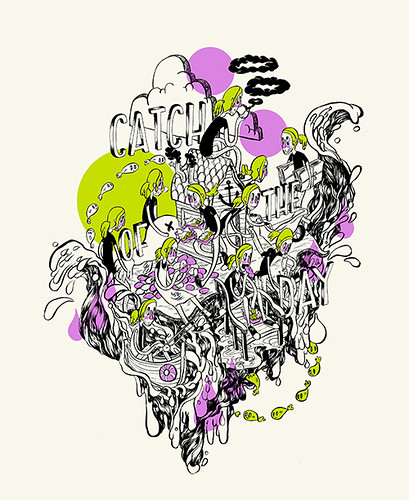 |
| Catch of the Day |
What are some of your biggest sources of inspiration? (travel,
subjects, materials, etc. )
I
love eating, so food and the experience of eating (dining out, as a social
activity, as a metaphor, etc.) is one of the mainstays of inspiration and
subject matter. Besides that, other sources of inspiration include daily life,
especially the really mundane stuff, and conversations, comics, fiction and
non-fiction books, and drawing really late into the night—that's when the world
seems to open up.
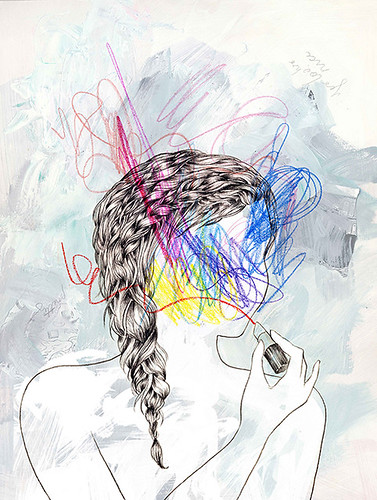 |
| Makeup |
You do many different kinds of projects, including comics,
illustrations, drawings, personal and client based works. What are some of the
biggest differences between your process while making completing these
projects?
The
differences in the process depends on the nature of the project, and who it's
for. For most illustrations I approach in a very controlled sort of way. It's
actually a lot of writing down ideas, symbols, associations, etc., that happens
before I begin drawing, or even thumbnailing. There's definitely a very
structured approach that follows a specific sequential process, especially so
when working for a client.
I
approach comics with more of a free hand in terms of subject matter, visual
approaches, and story-telling. They remain deeply personal and less constrained
by notions of what something should look like or abiding by certain
conventions. When I work on a comic, I think about the kind of story I'd like
to tell and why it's interesting, and go from there, without specific
expectations of what I think it should be. Sometimes I'm surprised by the
direction they go in, and it's a lot like watching a film play out in my head
and I'm just documenting it.
While
the processes are very different, they work for the each particular project so
I can't say that one way is better than the other. A lot of the creative
process is about adapting to each project in any case and remaining open to
ideas, influences, and ways of working,
You are one of the participating artist in the Stacks
Exhibition. Could you talk about your year, zine, and the behind-the-scenes
work for this particular piece?
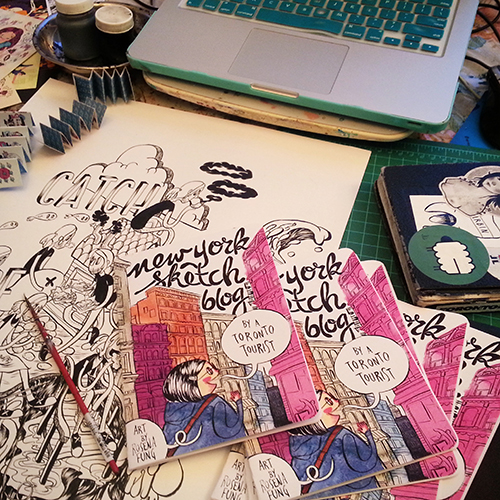
My
year for the Stacks Exhibition is 2013. For my zine, I depicted my trip
to New York City, the first time I had ever gone. I went with some friends to
attend the Society of Illustrators' Student Scholarship Show and it was four
days of the most fun I've ever had in my life with such an amazing and talented
group of people. I fell in love with the city, its energy and people. When I
came back, I wanted to capture its effervesence and the immediacy of each
moment as I experienced it.
What are some of your most important moments in the past thirty
years for your creative career? (The year you decided to go to school? The time
you saw... The first time you picked up a material, etc. )
In
Grade 7 a friend brought in a Calvin and Hobbes collection, It's a Magical
World, and I read it for the first time. I think that was one of the most
seminal moments of my creative career. I had been drawing comics before that,
but they took on a concrete form from then on. I really started to seriously
look at sequential art and storytelling as a compelling medium for art and
writing.
Going
to OCAD University was a crucial part of my creative development. I learned so
much in such a short period of time, not just about image-making, but in terms
of self-development and the program really instilled in me a stringent work
ethic. I met some of the most brilliant, talented, and generous people at that
school, whose work I greatly admire and who have helped me so much in my own
work.
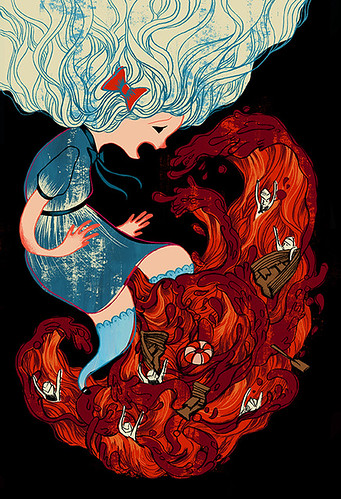 |
| First Period |
The Stacks zines are not only presented in the gallery,
but also given to each of the contributing artists. Did this add additional
pressure, inspiration, motivation?
The
nature of the Stacks exhibit and project was inherently personally
motivating. I love zines so much; they can be raw and honest, and really
heartbreakingly beautiful. The idea of authenticity is often ridiculed and
debated in the context of postmodernism and irony, but zines are one of the
very few things I can say feels very authentic; regardless of the motivations
of the creator and its influences, there is still something very honest and
personal about zines. Knowing that I was part of a project of this scope was
amazing.
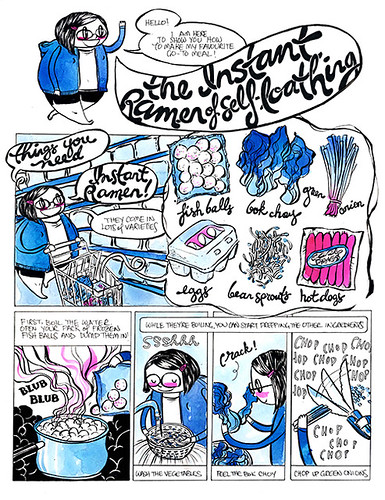 |
| Instant Ramen of Self-Loathing, page 1 |
There seems to be an inherent sense of community built into the
world of comics. Could you share your experiences with collaboration, sharing
projects, and conventions?
In
the past few months, I've started discussing with other friends about different
collaborative projects. Working solitary for your entire life and suddenly
opening up your personal creative process can be intimidating, but also
incredibly rewarding. We shall see how it goes, but I'm pretty excited about
the prospects!
Zines
and comic fairs are very fun: they are full of great collective energy and you
meet really awesome people. Last year I co-organized a zine fair last year, and
I attend as many as I can in the city. There's something special about the
comics and zine community: if you're doing it, it's because you love it,
unequivocally. And so meeting other comic creators and their fans is like a
homecoming.
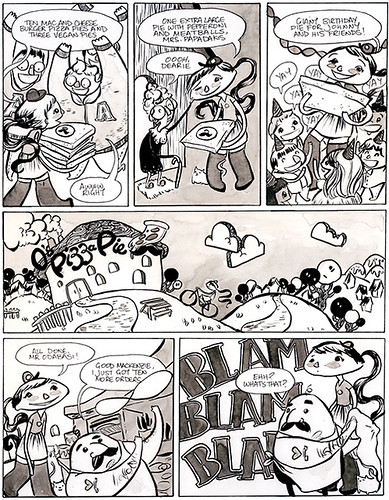 |
| Pizza Pie Wars, page 2 |
What projects are you currently working on?
I've
got a few projects on the go right now. I'm currently working on a compilation
of autobiographical comic shorts for a new zine, as well as writing a longer
comic story that I want to risograph. I'm also working on a new illustration
and typography portfolio: I'm very excited to try new media, expand my visual
vocabulary, just try new things out.
What are some of your favorite resources? Best places, books,
movies, website for inspiration?
I
love hanging out at the public library, Toronto has probably one of the best
public library systems, ever. My favourite resources for inspiration are
comics, but it would be impossible to whittle down a list of favourite
creators. Anything by Jillian Tamaki would top that list though, for both
illustration and comics. Also a fan of Wes Anderson and Charlie Kaufman movies,
and anything written by David Foster Wallace. I also enjoy looking at a lot of
different design and illustration blogs, plus I am religiously addicted to Sam
Weber's podcast Your Dreams My Nightmares. I'd say a lot of the people
around me are the greatest resources I have—the community of other illustrator-
and artist-friends who are in it with me together. They are great and I love
them!
Thank you, Rosena! If you'd like to see more of Rosena's work, or follow her artistic activity, you can check out her website, blog, and follow her on Twitter and Instagram.
Thank you, Rosena! If you'd like to see more of Rosena's work, or follow her artistic activity, you can check out her website, blog, and follow her on Twitter and Instagram.

